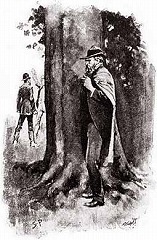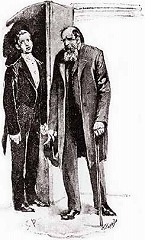“It is obvious. And now, you see, I had narrowed the field down considerably. The possession of a gray garment was a third point which, granting the son’s statement to be correct, was a certainty. We have come now out of mere vagueness to the definite conception of an Australian from Ballarat with a gray cloak.”
“Certainly.”
“And one who was at home in the district, for the pool can only be approached by the farm or by the estate, where strangers could hardly wander.”
“Quite so.”
“Then comes our expedition of to-day. By an examination of the ground I gained the trifling details which I gave to that imbecile Lestrade, as to the personality of the criminal.”
“But how did you gain them?”
“You know my method. It is founded upon the observation of trifles.”
“His height I know that you might roughly judge from the length of his stride. His boots, too, might be told from their traces.”
“Yes, they were peculiar boots.”
“But his lameness?”
“The impression of his right foot was always less distinct than his left. He put less weight upon it. Why? Because he limped - he was lame.”
“But his left-handedness.”
“You were yourself struck by the nature of the injury as recorded by the surgeon at the inquest. The blow was struck from immediately behind, and yet was upon the left side. Now, how can that be unless it were by a left-handed man? He had stood behind that tree during the interview between the father and son. He had even smoked there. I found the ash of a cigar, which my special knowledge of tobacco ashes enables me to pronounce as an Indian cigar. I have, as you know, devoted some attention to this, and written a little monograph on the ashes of 140 different varieties of pipe, cigar, and cigarette tobacco. Having found the ash, I then looked round and discovered the stump among the moss where he had tossed it. It was an Indian cigar, of the variety which are rolled in Rotterdam.”

“And the cigar-holder?”
“I could see that the end had not been in his mouth. Therefore he used a holder. The tip had been cut off, not bitten off, but the cut was not a clean one, so I deduced a blunt pen-knife.”
“Holmes,” I said, “you have drawn a net round this man from which he cannot escape, and you have saved an innocent human life as truly as if you had cut the cord which was hanging him. I see the direction in which all this points. The culprit is- -”
“Mr. John Turner,” cried the hotel waiter, opening the door of our sitting-room, and ushering in a visitor.

The man who entered was a strange and impressive figure. His slow, limping step and bowed shoulders gave the appearance of decrepitude, and yet his hard, deep-lined, craggy features, and his enormous limbs showed that he was possessed of unusual strength of body and of character. His tangled beard, grizzled hair, and outstanding, drooping eyebrows combined to give an air of dignity and power to his appearance, but his face was of an ashen white, while his lips and the corners of his nostrils were tinged with a shade of blue. It was clear to me at a glance that he was in the grip of some deadly and chronic disease.
“Pray sit down on the sofa,” said Holmes gently. “You had my note?”
“Yes, the lodge-keeper brought it up. You said that you wished to see me here to avoid scandal.”
“I thought people would talk if I went to the Hall.”
“And why did you wish to see me?” He looked across at my companion with despair in his weary eyes, as though his question was already answered.
“Yes,” said Holmes, answering the look rather than the words. “It is so. I know all about McCarthy.”